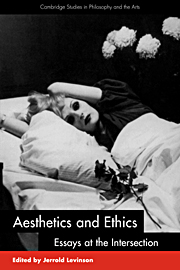Book contents
- Frontmatter
- Contents
- Editor's acknowledgments
- List of contributors
- 1 Introduction: aesthetics and ethics
- 2 Three versions of objectivity: aesthetic, moral, and scientific
- 3 Aesthetic value, moral value, and the ambitions of naturalism
- 4 On consistency in one's personal aesthetics
- 5 Art, narrative, and moral understanding
- 6 Realism of character and the value of fiction
- 7 The ethical criticism of art
- 8 How bad can good art be?
- 9 Beauty and evil: the case of Leni Riefenstahl's Triumph of the Will
- 10 The naked truth
- 11 Aesthetic derogation: hate speech, pornography, and aesthetic contexts
- Bibliography
- Index of names and titles
7 - The ethical criticism of art
Published online by Cambridge University Press: 22 March 2010
- Frontmatter
- Contents
- Editor's acknowledgments
- List of contributors
- 1 Introduction: aesthetics and ethics
- 2 Three versions of objectivity: aesthetic, moral, and scientific
- 3 Aesthetic value, moral value, and the ambitions of naturalism
- 4 On consistency in one's personal aesthetics
- 5 Art, narrative, and moral understanding
- 6 Realism of character and the value of fiction
- 7 The ethical criticism of art
- 8 How bad can good art be?
- 9 Beauty and evil: the case of Leni Riefenstahl's Triumph of the Will
- 10 The naked truth
- 11 Aesthetic derogation: hate speech, pornography, and aesthetic contexts
- Bibliography
- Index of names and titles
Summary
This essay argues that the ethical criticism of art is a proper and legitimate aesthetic activity. More precisely, it defends a view I term ethicism. Ethicism is the thesis that the ethical assessment of attitudes manifested by works of art is a legitimate aspect of the aesthetic evaluation of those works, such that, if a work manifests ethically reprehensible attitudes, it is to that extent aesthetically defective, and if a work manifests ethically commendable attitudes, it is to that extent aesthetically meritorious.
This thesis needs elucidation. The ethicist principle is a pro tanto one: it holds that a work is aesthetically meritorious (or defective) insofar as it manifests ethically admirable (or reprehensible) attitudes. (The claim could also be put like this: manifesting ethically admirable attitudes counts toward the aesthetic merit of a work, and manifesting ethically reprehensible attitudes counts against its aesthetic merit.) The ethicist does not hold that manifesting ethically commendable attitudes is a necessary condition for a work to be aesthetically good: there can be good, even great, works of art that are ethically flawed. Examples include Wagner's Ring Cycle, which is marred by the anti-Semitism displayed in the portrayal of the Nibelungen; some of T. S. Eliot's poems, such as Sweeney among the Nightingales, which are similarly tainted by anti-Semitism; and Leni Riefenstahl's striking propaganda film, The Triumph of the Will, deeply flawed by its craven adulation of Hitler.
- Type
- Chapter
- Information
- Aesthetics and EthicsEssays at the Intersection, pp. 182 - 203Publisher: Cambridge University PressPrint publication year: 1998
- 98
- Cited by



